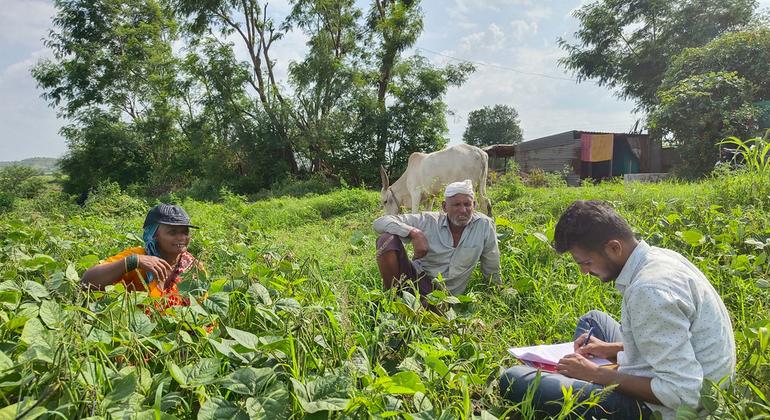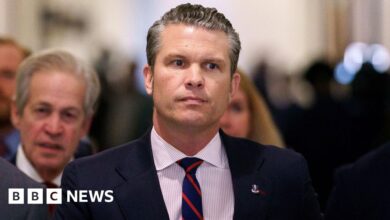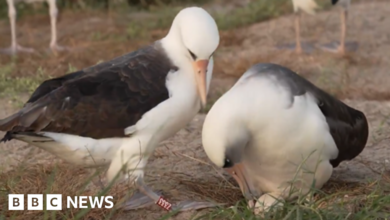Meet the ‘Land Heroes’ who are fighting desertification

Ten “Land hero” from around the world, all under 35 years old, have been selected by the United Nations Convention to Combat Desertification (UNCCD) to share their achievements and ideas on sustainable land management in the face of the growing global threat of desertification and land loss.
According to UNCCD No. 16th Global Conference on Desertification, COP16continues in Riyadh, meet the 2024 Land Heroes and read how they can inspire change, unite their colleagues, provide mentorship and demonstrate the transformative power of action collective.
Rokiatou Traoré describes himself as a “green entrepreneur” and is working in Mali to build a social enterprise based on moringa products.

Rokiatou Traoré displays a moringa tree.
About 100 women have been trained to create products from 20,000 trees; These include organic teas, powders, oils, soaps, spices and baby foods that have been exported to more than seven countries.
In 2023, she produced 150,000 drought-resistant moringa seedlings from seed for 5,000 women and young farmers.
“A seed is a dormant life,” she said. “Give it water, land and protection and it can solve the problem of desertification, poverty and malnutrition of women for good. “
Her future plans are ambitious. By 2030, she wants to establish a network of millions of women moringa producers, plant 10 million moringa trees, and export products made from moringa to national, regional, and international markets.
“There is nothing that cannot be achieved with a determined will.”
Planting trees is also high on Takudzwa Ashley Mlambo’s agenda as they are vital in efforts to regenerate soil and reverse desertification.

Takudzwa Ashley Mlambo (right) chats with young people in a garden in Zimbabwe.
His youth-led Forestry & Citrus Research Foundation (FACIR) aims to plant and monitor a total of one billion trees across Zimbabwe.
A self-proclaimed disruptive innovator, he uses artificial intelligence and satellite monitoring to oversee the initiative.
He found that afforestation is an important step to take to slow climate change and keep global temperatures below 1.5 degrees Celsius above pre-industrial levels. “The greener we go,” he said, “the cooler it becomes.”
The Philippines is one of the most vulnerable countries in the world to natural hazards, and these dangers, such as the series of typhoons hitting the country, are becoming more intense due to climate change. climate change.

Billie Crystal G. Dumaliang is committed to reforestation.
Deforestation and river basins around the Philippine capital Manila have put the city at greater risk of extreme weather events.
Billie Crystal G. Dumaliang and the Masungi Georeserve Foundation, which she leads, have committed to an ambitious afforestation initiative to restore approximately 2,700 hectares of degraded watershed areas around the Georeserve.
This project is important to strengthen Metro Manila’s natural defenses against the effects of climate change.
“Filipinos are suffering from the severe impacts of drought and land degradation on agriculture, wellbeing and daily life, so we need to conserve biodiversity and minimize the impacts,” she said. of drought and climate change. My organization does this through protecting land on the ground, planting forests and telling impactful stories supported by sustainable geotourism.”
Growing up in what was described as “a marginalized farming family,” Siddhesh Sakore witnessed firsthand the economic hardships endured by farmers and their families.

Siddhesh Sakore takes care of crops in a field in Pune, India.
One of the main issues that his organization AGRO RANGERS focuses on is land degradation, which directly affects the productivity of land and therefore the livelihoods of farmers.
Land degradation can be caused by improper use or poor management as well as erosion, flooding, desertification and chemical pollution.
His dream is to create livelihoods for farmers, especially in drought-prone areas of Pune, where he works by converting from chemical farming to organic-based agroforestry practices. .
“At AGRO RANGERS, we believe that the fight against land desertification and drought starts with sustainable, community-driven agricultural practices and the innovative approach of agroforestry.”
“By empowering farmers with the knowledge and tools to integrate trees and crops into their farming systems, we are restoring and protecting the land, nurturing it for a resilient future and sustainable.”
“Working alone is not an option to create meaningful change,” said Astrid Peraza. So she tested this perspective as a youth climate educator in Costa Rica by developing “Rescue the Penguins,” a collaborative board game designed to teaches players about climate. change and its solution.

Astrid Peraza researches land regeneration issues in Costa Rica.
She is also actively involved in the Vivero Verde Mar mangrove planting project in this Central American country, to support environmental conservation and help prevent desertification in coastal areas.
“It is very important for communities to overcome the difficulties of land desertification together, because when we talk about climate change, working alone is not an option,” she said.
There are a total of 10 Earth Heroes. Read more This.
Several Land Heroes are expected to attend COP16 in Riyadh




